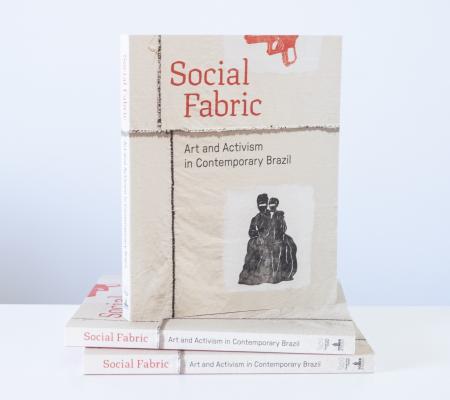Social Fabric: Art and Activism in Contemporary Brazil brings together the work of ten artists who reflect upon the long-standing histories of oppressive power structures in the territory now known as Brazil. Blurring the line between art and activism, these artists contribute to local and global conversations about the state of democracy, racial injustice, and the violence inflicted by the nation-state.
Published and distributed by Tower Books, University of Texas Press in English in November 2023, the Portuguese translation of Social Fabric: Art and Activism in Contemporary Brazil is now available as a free ebook. It is distributed by Cultura Acadêmica Editora, an imprint of the State University of São Paulo Press (Editora Unesp). Tecido social: Arte e ativismo no Brasil contemporâneo is 166 pages long and features 130 illustrations.
The book-length study of contemporary Brazilian art assembles artist-authored texts by Denilson Baniwa, Castiel Vitorino Brasileiro, and Maré de Matos; interviews with Castiel Vitorino Brasileiro, Aline Motta, and Rosana Paulino; artist essays; and a conceptual mapping of Brazilian history illuminating the function of art as a critical space for engagement with the historical, political, and cultural configurations of a particular place.
Edited by Maria Emilia Fernandez, Dr. Adele Nelson, and MacKenzie Stevens, Social Fabric: Art and Activism in Contemporary Brazil documents and builds on the Visual Arts Center’s exhibition of the same name, on view in 2022–2023 and supported by a grant from The Andy Warhol Foundation for the Visual Arts. The book is the first full-length study of the intersections between art and activism in Brazilian contemporary art.
Artists featured are: Denilson Baniwa, Castiel Vitorino Brasileiro, Guerreiro do Divino Amor, Jaime Lauriano, Maré de Matos, Aline Motta, Lais Myrrha, Antonio Obá, Rosana Paulino, and Sallisa Rosa.
The publication is made possible by a grant from The Andy Warhol Foundation for the Visual Arts. Lead support also provided by the Instituto Guimarães Rosa of the Ministry of Foreign Affairs of Brazil through the Consulate General of Brazil in Houston; Mendes Wood DM, São Paulo, Brussels, New York; and Nara Roesler, New York, Rio de Janeiro, and São Paulo. Additional support provided by Allison and David Ayers and the Center for Latin American Visual Studies (CLAVIS); the Center for Women’s and Gender Studies; the Jackson School of Geosciences; the LLILAS Brazil Center; the Meredith and Cornelia Long Chair in Art and Art History; the Office of the Dean, College of Fine Arts; and the Office of the Vice President for Research, Scholarship, and Creative Endeavors at the University of Texas at Austin.
###
The Portuguese translation is also available on the VAC website.
The English edition is available on the UT Press site.


